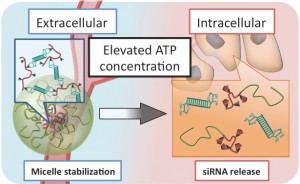A new molecular strategy for advanced nucleic acid medicine Intracellular ATP triggers controlled release of nucleic acids


A release of siRNA from the delivery carrier in response to intracellular ATP concentration was observed. © Mitsuru Naito.
Short interfering RNA (siRNA) offers great potential as a therapeutic agent for cancer therapy. siRNA is known for its gene-silencing ability in a remarkably sequence-specific manner, through the destruction of complementary mRNA (RNA interference, RNAi) resulting in knockdown of target proteins. In order to validate the clinical application of siRNA, development of effective delivery carriers is a central issue, as otherwise its rapid renal clearance and RNase-related decomposition are inevitable. Professor Kataoka and his colleagues at the Department of Materials Engineering in the Graduate School of Engineering have reported a new strategy to accomplish the delivery of siRNA specifically to sites in the intracellular environment with universally-elevated concentrations of adenosine triphosphate (ATP). The technique capitalizes on preparation of a polyion complex (PIC) micelle-based nanoparticle encapsulating siRNA, formed through electrostatic interaction between a positively charged synthetic polymer and negatively charged siRNA. Phenylboronate functionality, which was responsible for the binding with the 3’-end ribose group of siRNA, was also incorporated as a side chain to the homing cationic polymer. This modification allowed stable PIC micelle formation and resulted in effective protection of siRNA from enzymatic degradation in the extracellular environment, and which, conversely, allowed for the release of siRNA on entering the cytoplasm, wherein an increase of the ATP concentration was manifested. This new technique may pave the way for enhanced therapeutic efficacy even in many currently intractable diseases.
Press release [PDF] (Japanese)
Paper
Mitsuru Naito, Takehiko Ishii, Akira Matsumoto, Kanjiro Miyata, Yuji Miyahara, Kazunori Kataoka,
“A Phenylboronate Functionalized Polyion Complex Micelle for ATP-Triggered Release of siRNA”,
Angewandte Chemie International Edition, Vol.51, 2012: 10751-10755, doi: 10.1002/anie.201203360.
Article link
Links
Graduate School of Engineering
Department of Materials Engineering, Graduate School of Engineering
Kataoka Laboratory, Department of Materials Engineering, Graduate School of Engineering
Institute of Biomaterials and Bioengineering, Tokyo Medical and Dental University
Yuji Miyahara Laboratory, Tokyo Medical and Dental University







